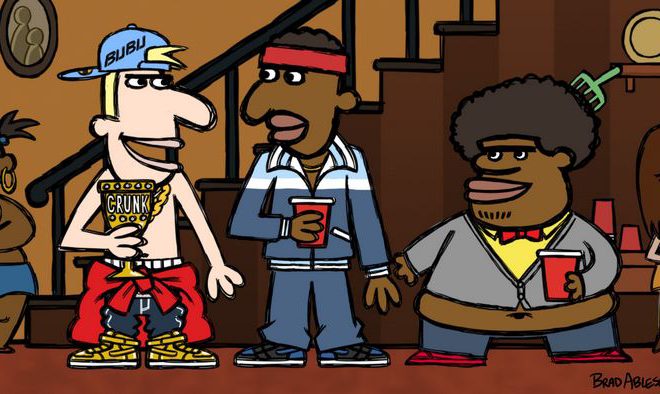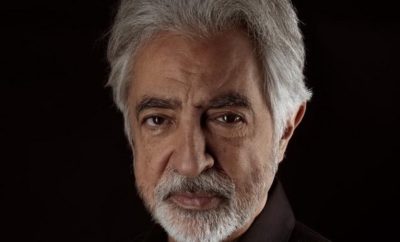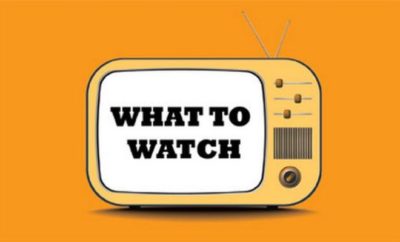
Interviews
Legends of Chamberlain Heights – Brad Ableson, Carl Jones & Quinn Hawking
By: Anna Ruth Ramos
Brad Ableson: Having worked on The Simpsons for years, wanting to get my own thing going. Me and this other producer stumbled upon this YouTube video, where it turned out to be this guy Josiah and Quinn… They had taken this Nike commercial where it was puppet LeBron James and puppet Kobe. They redid the voices to be just really dirty, and fucked up, and racist. It made us laugh. They talked like real kids and we thought, “Man, we should make a cartoon with these guys.” So I put together a real simple animation test, where I purposely wanted the look to be crude and simple, and sort of punk rock looking like their voices were. We made a five-minute little short, went to Comedy Central, pushed play, and they pretty much bought it in the room. They said, “This is fucking weird and we don’t understand it, but it makes us laugh. Go make a season.” We just completed Season 1, which is about to air and they already ordered our Season 2, and we haven’t even aired it yet, so I guess we’re doing something right.
Tell me about designing the look for this, I mean, what does it look like in terms of other animation?
Brad: It’s really simple. I wouldn’t say it looks like South Park, but it’s got that simplicity. I also helped develop the show The Life & Times of Tim on HBO. We employed that simplicity. The designs are just a mish-mash of the way I draw, and my childhood influences like MAD Magazine, Sergio Aragones, and Don Martin. Some of my current favorite artists are Shag and Derek Yaniger. Just real flat and simple, and like I said, the style is so purposely simple and good-looking that their voices just are a perfect match.
What made you guys choose an animated format instead of just a sitcom in general?
Quinn Hawking: I guess just because I came from animation, and it was the best shot I had at getting something made. The best shot at getting it picked up.
Brad, talk about your friendship with Josiah and how that plays out in your show.
Quinn: We met at UCLA. He’s a year older than me. School was about to start. We were obviously both on the basketball team. I hadn’t met him yet. It was a party right before school started. He walked in with a 40, and I said, “We’re going to be friends.” We immediately hit it off. (laughs).
Neither of us were a star player, so I think that grouped us together in many ways. We would just be on the end of the bench during the games and at some point as an 18-year-old, 19-year-old kid, you stop paying attention to the game when you know you’re not going to get in and we would just look at girls in the crowd and comment and plan what we were going to do that night.
If we were on a road trip, we would plan how we were going to sneak out. I think once we met Brad, we decided that this show would be funnier if you put those guys on the end of the bench and have them be legends in their own mind. We were able to take a lot of our personal experiences and throw them right into the characters because even though our guys are bench-warmers, they think that they’re LeBron. (laughs). They think that they’re something special to the world. I think that adds an interesting dynamic and comedy to the show.
Brad: Once we learned that about Josiah, we decided to make every episode start with just the three dudes on the bench, not getting to play, so they just start talking about what they’re going to do and who everyone’s going to go with, and it just goes off the rails from there. This guy Carl Jones who is a legendary executive producer and voice actor from Black Dynamite and Boondocks, we were lucky to get him on the writing stuff, and he provides the smart writing and some of the funniest voices in the show. We’re lucky to have him.
Well Carl, what’s the writing process like on the show? How much an effect do these guys have on the show?
Carl Jones: Everybody puts both feet in. Josiah, I worked with him closer. Brad comes into the writer’s room every now and then and does most of his comedy writing on the visual end. We work together and I don’t know in terms of a formula, but we all get together and try to pitch ideas for stories. Usually, they’re character driven stories. We try to wrap the social commentary and any type of satire we want to do around that. Then we figure out something we want to say, and we try to make it honest. We put it out to the room. We pitch jokes. We get to be able to flesh out ideas. From there we pass it on to the best writer that has the best take on that particular story. That’s the process.
What are some real life events that you guys turned into episodes? Or some of your life events that you turned into episodes?
Quinn: One of our episodes, these guys go to the bad part of town to get the hottest new shoes. I think that this came from personal experience because when I was in high school I would camp out to get the latest release of Air Jordans or something like that. We have one episode where they can’t get the hot shoes that just got released so they go to the “rough part of town” to get shoes. They get them, but then they find that the obsticle is getting back safely with these expensive pairs of shoes where multiple gangs are trying to rob them for their shoes. That’s just one example off the top of my head.
Carl: We got one episode where one of the guys falls in love with a stripper, and then learns later that it’s actually Tupac. (laughs).
Quinn: We’ve all been there.
Brad: He’s not joking.
How long were you guys making videos before you were found?
Quinn: That was 2000, and so Joe and I once we graduated from college, we both got jobs as production assistants at sports television. Fox Sports and their network. From there we both learned how to make our own stuff on the side. We started making music videos … And then met Brad and Mike and we made those Kobe, LeBron puppet commercials just for fun. They got a lot of traffic on YouTube. We’ve been developing this thing for a little while, for a couple of years. It’s been a ride for me. It started with editing and then came writing and acting. Now we’re both feet in and doing a little bit of everything on this show so it’s been a dream come true in many different ways.
Brad: Like we mentioned earlier we haven’t aired yet, but we already got a Season 2 pickup. So I guess we’re doing something right. We’re already balls deep in Season 2 which is why we all look so tired.
Quinn: I don’t see it as a coincidence that they’re releasing our show to the world, and it’s the same weekend that Ken Griffey Jr. is getting inducted into the Baseball Hall of Fame. He was my god when I was a little kid. I just wanted to throw that out there that I have a Ken Griffey Jr. baseball card tattooed on my arm. (laughs).
So what’s it like to see cartoon versions of yourself and to see them come to life with your voices?
Quinn: It’s cool.
Carl: What he meant to say was a nightmare. (laughs). He plays a fat black kid.
Quinn: It’s cool to see it in the different forms because the first is obviously to script, and then it’s to animatic. Then you get the color version back and you see it in color, but it still needs tweaks and stuff. When it really hit me was when saw the audio mix in the first episode, then it was like this is the show. That’s where it hit me, wow this is a reality now. It’s not just words on a paper or just us in the o-booth recording them. This is something you can touch in some sort of way.
Brad: His character couldn’t look less like him. He’s this short, fat, black dude with a huge afro with a high voice.
Quinn: The Jamal voice started with me saying, “Damn Kobe stop looking my dick!” That’s literally where that voice came from.
Brad: I heard that on that Nike spoof thing and we’re like this is a cartoon character and it never changed.
Quinn: It started with me bashing Kobe Bryant.
Brad: Then Josiah who’s the voice of our straight man lead. His voice is loosely based on Kobe. Then his white – wigger character, we directed him to just sound as fucking black and hard and thug as possible. So it’s just an angry black voice coming out of this square white dude.
Quinn: It’s based on MC Eiht. He did a voice on the video game Grand Theft Auto: San Andreas. There was a character in that called Ryder in the video game. It was voiced by MC Eiht. I remember when we were sitting down to do the voices specifically because Joe and I would just mess around and do voices around the house not thinking we were going to be voice-over actors, but just because it was fun. So Joe would always do this voice copying MC Eiht. And I was just like, “Do that voice.” It’s relevant that his character’s milk. It’s hilarious.
What do you guys hope the fans to take away from the show?
Brad: I think they’re going to find that it’s more real and authentic than any other prime time animated show. Shows like the Simpsons and Family Guy and South Park, they’re brilliant, but they’re written by older Ivy League dudes who may not be as well tapped into youth culture. This show is made and written and voiced by guys who are of that world, know the way kids talk, and it just has an authenticity that’s going to hit with a ton of kids who feel like they have no show they can relate to. That’s our hope that everyone under the age of 30 is like, “Fuck yeah, that’s how my friends and I talk when we’re fucking around trying to get laid.”
Quinn: I think just in general, we all have aspirations to want to be more than we actually are, and that’s what our characters are. They’re bench-warmers. They don’t get in the game, but they have aspirations to want to be bigger so I think there’s also a positive message in it as well. They do it in their own fucked up way, but people can relate to it because we’ve all been bench-warmers or been the low man on the totem pole. You always want to go higher, and I think that’s what our characters strive to do and probably what we all want to do in some way, shape or form.
Where is Chamberland Heights? Is it a real place?
Brad: It’s kind of a mish-mash of South Bay and LS and Englewood. The very first animation test we ever did had the background loosely based on the basketball court in Venice Beach where White Men Can’t Jump takes place. So we wanted to come up with our Springfield, our fake town. Initially, we just wanted to call the show Legends, and we couldn’t that name’s been used too many times. Then we’re like let’s figure out the name of the town they live in. Then we’re like, “Who’s the most legendary basketball player ever?” Wilt Chamberland. We just came up with the name Chamberland Heights, and that’s our show.
Quinn: Will was notorious for having sex with thousands of women, ten thousand he said. There’s a mythology around Wilt Chamberland. When we were pitching ideas for what should the city be named, we thought of Chamberland Heights. There were all these different pitches, and I think that one stuck out.
Brad: It’s unfortunately the longest hashtag ever, Legends of Chamberland Heights, but we’ll figure it out.
Are you guys at all worried about following in the footsteps of South Park coming on right after that show or is that a good thing?
Quinn: I think it’s a good thing. We were asked that earlier too. Is there pressure? It kind of made me think for a second because I get it if you’re following something that’s already great, I guess that there is some sort of a pressure.
Brad: We jokingly refer to our show as South Dark. It’s got some similarities. The characters are kids, freshmen in high school kids. They’re really simple when they move, the animation styles are very simple. It’s not a black show, but two of the three main characters are black.
Quinn: The white character is the blackest. (laughs).
Brad: Yes. He wants so bad to be able to say the n-word, but he can’t, and they slap him every time he even tries. This kid gets slapped about 10 times an episode.
Carl: We rarely talk about even being compared to South Park or anything else that’s out there. We just try to stay very honest. Create the most honest voice we could possibly make and characters that are most relatable to our own personal experience. Not even trying to create characters that appeal to everyone, just trying to find things that we have personally invested in and tell those stories. Hopefully, there’s people out there like us that want to hear those kind of stories and can relate to these characters and personalities.
How long does it take you guys to do an episode?
Brad: We do the Simpsons model where we start about 9 months ahead of time. We were doing 10 episodes all at once but they’re staggered so we’re starting one episode and another episode is often in this studio in Atlanta that actually puts animations together and then it’s coming back. I guess we’re getting in about 8 to 9 months. We can knock stuff out really fast. Yesterday about this time, is it 4 or 5 o’clock right now, our executive producer Joel, we were in an edit session and he’s like, “We should make a little 15-second cartoon to promote our panel.” These guys because they’re the voice literally just improvised a little 15-second promo and recorded it on a phone. We got it to an animator. He animated it and it was done in about 2 hours. It’s now on YouTube and Facebook, and I don’t have my phone on me but it’s pretty funny. We’ve got Erykah Badu as our music supervisor and one of the voices. She’s actually moderating our panels. We have her character pop up and promote the show.




You must be logged in to post a comment Login